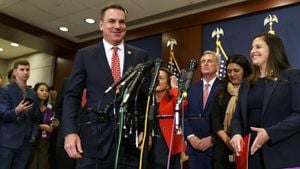Sri Lanka recently conducted its snap parliamentary election, concluding with relatively peaceful proceedings amid urgent political circumstances. The elections showcased the National People’s Power (NPP) party, led by President Anura Kumara Dissanayake, who is hoping to solidify his party's influence within the legislature. Voting took place at over 13,314 polling stations nationwide, with initial results expected to emerge after midnight following the vote counting.
Despite the tense backdrop, which included instances of recent civil unrest, the atmosphere during the voting period remained calm, largely due to the deployment of about 90,000 security personnel. Election monitors noted, though, the voter turnout fell short of expectations, with under 50% reported by midday. This is particularly noteworthy when compared to the soaring 79% turnout seen during the last presidential election.
For this election, out of the 21 million residents of Sri Lanka, approximately 17 million were eligible to vote for the 225 seats available within parliament, each vying for a five-year term. Many anticipated the NPP to secure more than half the parliamentary votes, which would theoretically allow them to pass legislation more freely, fostering the growth desired by both President Dissanayake and his constituents.
Geo-political and social dynamics remain at the forefront as the NPP seeks to unify various community interests, including the Tamil minority's needs from the northern regions. Dissanayake has publicly expressed his desire for the parliament to construct laws catering to all citizens. While some incumbent politicians lost their seats, the results indicated significant gains for the NPP in regions such as Jaffna and Vanni, where their support blossomed strongly.
For example, the NPP dominated polling divisions with over 9,000 votes, overcoming the Illangai Tamil Arasu Katchi (ITAK), which markedly trailed with just over 2,500 votes. This shift highlights the increasing acceptance of the NPP among traditionally opposing regions. The results, particularly from districts like Galle and Hambantota, demonstrated NPP's ability to capture substantial voter shares, pulling away from parties like the Samagi Jana Balawegaya (SJB) and Sri Lanka Podujana Peramuna (SLPP), which managed only minimal victories.
Former ministers from the SLPP faced defeat, such as Mahinda Amaraweera, Ramesh Pathirana, and Manusha Nanayakkara, pointing toward a significant political realignment. With the NPP winning multiple districts decisively, the broader narrative reflects shifting ideologies and distributions of voter loyalty following economic upheavals.
The snap election was not only about choosing representatives but also served to gauge public sentiment toward the government’s handling of subsequent crises, including economic disruptions and social discontent triggered by prior administrations. The NPP's victory could be seen as voters choosing stability and continued reforms over the past governance methods.
President Dissanayake’s ability to govern effectively hinges on securing the legislative majority. The electoral stakes could dictate policy-making directions and responses to current socio-economic challenges, which have left many citizens struggling since the pandemic's sequelae hit Sri Lanka.
Now, as the counting progresses and final figures are announced, analysts continue to watch how the NPP will navigate its newfound authority and if it can deliver on its promises. The expectations from diverse Sri Lankan communities will weigh heavily on the direction Dissanayake aims to take.
Despite concerns about low turnout, the election's peaceful execution highlighted the resilience of Sri Lanka’s democratic processes, indicating citizens’ commitment to participating in shaping their governance, even when confronted with obstacles. These elections mark more than just political shifts; they signify Sri Lanka’s pressing momentum for reform and social equity.
With the results trickling out and speculations on governmental restructuring flying, Sri Lankans grapple with both hope and apprehension about the future direction, eager to see how their new parliament will respond to widespread calls for change.
Overall, the 2024 parliamentary elections reflect the complex nature of Sri Lanka's political terrain, with shifts indicating potential new pathways for this traditionally responsive democracy.



